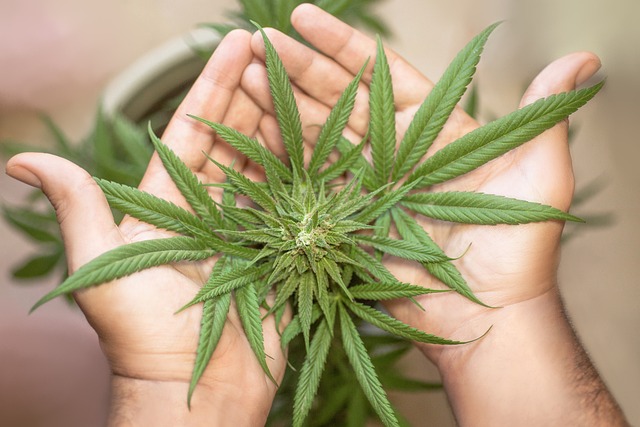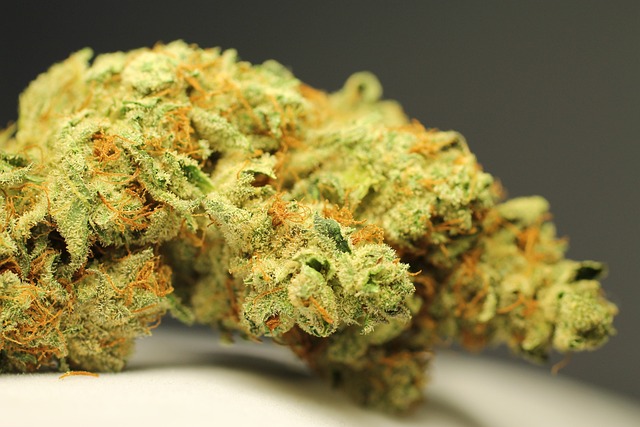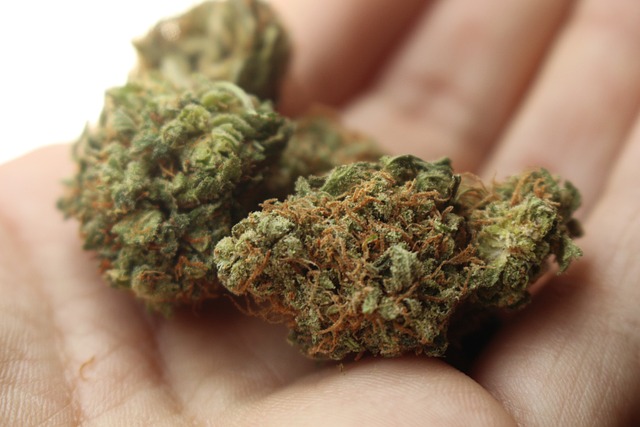THCA (tetrahydrocannabinolic acid), a non-psychoactive compound found in hemp and the precursor to THC, has become a prominent wellness product in Florida due to its legality under the 2018 Farm Bill. Unlike THC, THCA does not induce psychoactive effects, making it an attractive option for those seeking the potential health benefits of cannabinoids without mind-altering experiences. Its therapeutic properties, including anti-inflammatory and analgesic effects, have garnered interest among consumers looking to address conditions such as chronic pain and inflammation. THCA flowers can be consumed through various methods like smoking, vaporizing, or infusion into edibles, catering to a range of consumer preferences. As legal distinctions between hemp and marijuana continue to influence the market, the demand for THCA flowers, which are thca legal in Florida, is increasing, reflecting a growing interest in cannabinoid-based wellness solutions. This trend points to the expanding role of THCA in the health and wellness sector, with significant potential for growth as regulatory frameworks adapt to support hemp-derived products.
Explore the burgeoning landscape of cannabinoid wellness with a spotlight on THCA flower, a non-psychoactive compound gaining attention for its potential therapeutic benefits. This article delves into the rise of THCA’s popularity, shedding light on its legal status in Florida, where it stands as a promising option within regulated boundaries. We dissect the science behind THCA, contrasting it with other cannabinoids, and explore its unique role in the entourage effect. From cultivation to consumption, this comprehensive guide navigates the benefits of THCA flower, its legal considerations, and how to source it responsibly within Florida’s guidelines. Join us as we unravel the potential health advantages backed by research, and understand the nuances that set THCA apart from its counterpart THC. Whether you’re a novice or an experienced user, this article offers valuable insights for incorporating THCA flower into your wellness routine in compliance with Florida laws.
- THCA Flower: An Overview of Its Rise in Popularity
- Understanding THCA: The Potential Benefits of This Cannabinoid
THCA Flower: An Overview of Its Rise in Popularity

delta-9-tetrahydrocannabinolic acid (THCA) flowers have garnered significant attention within the cannabis community, particularly in regions where their use is regulated, such as Florida. THCA, the raw form of the psychoactive compound THC found in cannabis plants, offers a range of potential therapeutic benefits without the immediate psychoactive effects that delta-9-THC provides upon heating or combustion. As legal frameworks evolve to differentiate between hemp and marijuana, products derived from hemp, including THCA flowers, have become more accessible to consumers in states like Florida, provided they contain less than 0.3% THC on a dry weight basis according to the 2018 Farm Bill.
The rise in popularity of THCA flowers in Florida can be attributed to their non-intoxicating nature, which allows users to benefit from cannabinoids without experiencing impairment. This has broadened their appeal to individuals seeking relief from various conditions, such as chronic pain and inflammation, without the mind-altering effects associated with traditional THC products. The versatility of THCA flowers also means they can be consumed in various ways, including being smoked, vaporized, or infused into edibles, offering users a range of consumption methods tailored to their preferences and needs. As awareness of these benefits grows and regulatory frameworks continue to support hemp-derived products, the demand for THCA flowers in Florida and beyond is likely to increase, solidifying their place in the wellness market.
Understanding THCA: The Potential Benefits of This Cannabinoid

THCA, or tetrahydrocannabinolic acid, is a natural cannabinoid found in the Cannabis sativa plant. While it’s the precursor to THC (tetrahydrocannabinol), the psychoactive compound commonly associated with cannabis use, THCA itself does not induce psychoactive effects. This distinction is significant, as it allows for the exploration of THCA’s potential benefits without the mind-altering side of THC. Research into THCA has revealed a host of therapeutic properties that have piqued the interest of scientists and consumers alike. Proponents suggest that THCA may offer anti-inflammatory, neuroprotective, and analgesic effects, which could be beneficial for individuals dealing with pain, inflammation, or neurodegenerative conditions.
In the context of legal considerations, it’s worth noting the status of THCA within regulatory frameworks. As of the knowledge cutoff date, THCA is legal in Florida under certain conditions. The 2018 Farm Bill legalized hemp-derived products, including CBD and THCA, containing less than 0.3% delta-9-THC across the United States, provided they are sold and labeled appropriately. This legislation has opened avenues for research into the potential benefits of THCA, allowing consumers to explore its properties legally. As such, those interested in the wellness aspects of cannabinoids may find THCA an appealing alternative or addition to their wellness routine, especially given its promising therapeutic qualities and legal status in states like Florida.
THCA-rich flowers have garnered significant attention, particularly within the context of their legal status and purported health benefits in states like Florida. As highlighted throughout this article, THCA, or tetrahydrocannabinolic acid, is a non-psychoactive cannabinoid found in hemp that offers numerous potential wellness advantages, which are currently being explored by researchers and experienced by users across the nation. In light of its legal standing in Florida, enthusiasts and health-conscious individuals can now explore the therapeutic properties of THCA flowers with greater ease. The increasing popularity of these flowers underscores their versatile applications, from wellness routines to culinary endeavors. As science continues to unravel the intricacies of THCA’s effects, its potential role in natural health regimens may become increasingly recognized and embraced within communities seeking holistic solutions.
